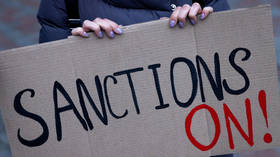Ivan Timofeev: Why the West's anti-Russian sanctions are politically pointless

It’s now been over a month since a tsunami of Western sanctions hit Russia.
Their unprecedented scale is a notable characteristic. All key industries are under attack. Russia’s reserve assets abroad have been frozen. Tough control measures have been imposed on exports, especially when it comes to technology and industrial goods.
All of this happened within an extremely short period of time. Something like this has occurred in Russia’s history only once before – after the 1917 Bolshevik revolution. Even during the Cold War, the Iron Curtain was gradually eroding, but now it's in the process of being actively rebuilt.
Another peculiarity is the zeal with which the Western business community is following through on the sanctions, often running ahead of the politicians. Companies tried to stay away from politics before, and now corporations boycott even those sectors that haven’t been officially sanctioned – from the fast-food industry and furniture retail to denying access to academic publications.
These boycotts are turning into the “cancel Russia” culture, when anything Russian is being restricted. Confiscating assets abroad without any legal proceedings falls in the same category.
Undoubtedly, the Russian economy will suffer significant losses because of the sanctions. Disrupted trade and transport networks and the West’s financial and technological blockade will lead to high inflation, unemployment, failing labor productivity, a weakened technological base and a struggling economy as a whole. This damaging effect will last and get worse in the medium to long-term, strengthened by the fact that Russian commodities will be gradually squeezed out of Western markets.
The sanctions, however, will have little to no impact on Russia’s policy. Moscow simply doesn’t believe that any concessions in Ukraine or elsewhere will result in the West rolling back the punishments.
It sounds like Russia is very pessimistic about the situation, recognizing the fact that they are here to stay. Yes, we might expect that Western states will ease certain restrictions in order to soften the blow to their own economies. But that’s the extent of it. Historically, we know that restrictions imposed on major nations fail to force them to change course.
It is also very unlikely that the sanctions will encourage regular Russians to take to the streets and “overthrow the regime.” Yes, it is true that the attack on the economy forces the middle class into poverty, while the poor find themselves below the poverty line. But society will mostly blame the West, not the Kremlin.
This means that the sanctions will only fuel anti-Western sentiment. The whole cancel culture aspect solidifies this even further. People will not accept a situation where they are being humiliated for simply being Russian – no matter how they feel about the military operation in Ukraine.
Have we seen the full extent of anti-Russian sanctions? Probably not. Technically, they could be expanded, although the West will now be more careful, considering how it is already suffering some blowback.
However, there is a more important factor to consider. Regular Ukrainians and Russians are the main victims of the armed conflict. Any military confrontation must be settled and resolved, because the lives and future of these people are more important than any sanctions, ambitions, or prestige.
Nobody knows how long the hostilities will last before the sides can reach a peace deal. It would be ideal if this agreement could solve the security issues of both countries once and for all, as opposed to being another empty deal and an open door for a new escalation in the future.
This article was first published by Kommersant














